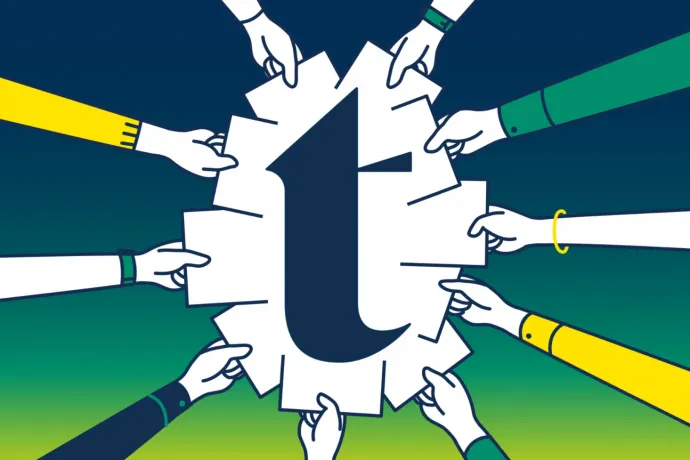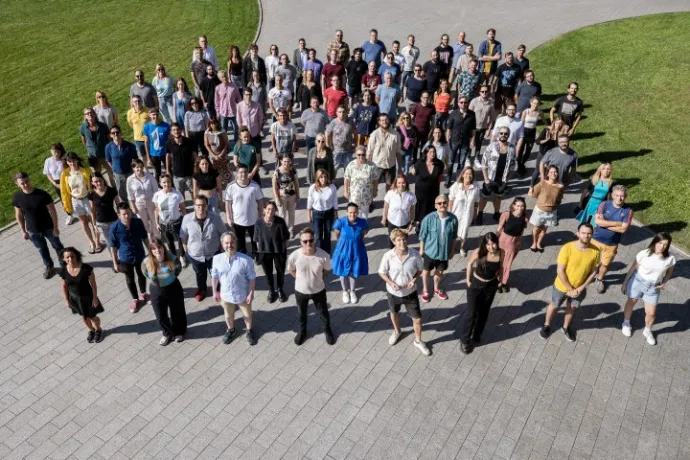
We have recently reached the end of a process that is unique in the Hungarian media market: our employees have become owners of Van Másik Zrt., the company that publishes Telex, and most of our colleagues have already been issued their shares.
This was the promise we made at the outset, and while the time that has passed since then may seem long, when we take a look back at the whole process, we are satisfied that the programme is now completed. Never before has this been done on such a large scale and in this format in the Hungarian press. While there have been some promises before, none of them ever came to fruition. It is for this reason that I’d like to share a little more about this process!
When Telex was first launched, we promised our colleagues, our supporters, our readers and ourselves that Telex would be owned by its employees. There were many reasons for this, but perhaps the most important one was that we wanted to guarantee to ourselves and to our readers that we would never again have decisions affecting our work, our independence, our lives made over our heads, based on the interest of someone outside of our editorial office. We wanted to find a solution that would ensure that the newspaper wouldn't fall into the hands of oligarchs or political profiteers. We believe that the best guarantee of this is for us to be our own masters.
We had to find a structure that ensures the company’s effective operation, while at the same time giving the editorial staff influence and a say in the most important professional matters.
Immediately after we launched the paper, this wasn't the most important thing we focused on. We focused on making sure that we had a well-functioning newspaper, that we had an editorial system, that we had an app, to make sure that we can provide salaries for our staff, that we had an office, phones and computers, that we had as many excellent colleagues as possible and as many high quality articles as possible, that we had correspondents throughout the country, and on making sure that we had as many readers as possible and that we could function reliably.
Once all of this was on relatively stable footing, we turned to the issue of ownership, and immediately ran into a legal obstacle: only 15% of the company could be distributed as classic employee shares, and all the other options would have involved a serious tax burden, legal wrangling, uncertainty and an administrative burden. As we were working on this, we received the news that an amendment to the law would abolish the 15% limit, which meant that we could go back to square one, which was still the simplest solution. However, we basically had to redesign everything, while also taking care of the operational and journalistic priorities that had been set at the start.
In the end, with the strong support of our staff (93%), last summer we managed to lay the foundations for the process that has now been completed.
As a result, the company which was previously owned by one person, its founder Márton Kárpáti, has been transformed into a private limited company. In a series of steps, as requested by the editorial office, 75% of the shares became equally divided employee shares. The special feature of the employee shares is that they can only be issued to Telex employees, never to external parties. This ensures that Telex will always be owned by Telex employees, i.e. in fifty to one hundred years' time. In other words, in order to acquire Telex shares, one must be employed at Telex.
The remaining 25% of the shares are divided as ordinary and preference shares between Szabolcs Dull, András Kárpáti, András Pusztay and Márton Kárpáti, who are also the company's leaders. As a result, they have greater responsibility, a greater say in the operation of the company and greater voting rights.

At the same time, Telex has not only become the property of the current Telex employees, but the current editorial board will always have a strong say and a major influence on key issues:
- The current editor-in-chief and the board representing the editorial office will participate in the management of the company and will have voting rights in the company's governing body.
- If an outside investor is to be involved, the elected body representing the editorial office must give its consent, i.e. if the editorial office does not support it, no one, no outside player can acquire ownership in the company and no one can take out a loan on its shares. This is a very strong guarantee that no outside actor can become a shareholder in Telex without the approval of Telex’s editorial office.
- The editorial office has been given the right to propose and approve the appointment and removal of the editor-in-chief: the appointment or removal of the editor-in-chief must also be approved by the elected editorial board, i.e. no one can forcibly remove the editor-in-chief.
A few further, important points:
- If a shareholder leaves the company, they are not allowed to sell their Telex shares; the shares can be acquired either by the company or other Telex shareholders.
- The shares were distributed among those who were employees of the company on 1 May last year and have been working for Telex ever since. This currently includes 72 shareholders in addition to the managing body's ordinary shareholders.
- Due to turnover, the employee share package will be redistributed every 4 years, so that those who joined the company after 1 May last year or in the interim can also become owners.
- Share ownership also entitles the holder to a dividend, which is subject to profit and approval by the general assembly. However, no dividends will be paid from any proceeds from donations (nor from any other sources in the foreseeable future).
While the employee share scheme was clearly the easiest way forward following the aforementioned change in the law, it still required a lot of work. On top of the day-to-day tasks and running the paper, everyone had to open a securities account, all sorts of data had to be gathered, verified and reconciled in several rounds, and we had to wait for several official, court and supervisory approvals to be granted before reaching the end of the process. For anyone who hasn't done this before, we can now tell you that it's much more stringent and complicated than simply opening a bank account and making a transfer, and on top of that, it varies from bank to bank as to when and what is needed, and how. So it was far from easy.
Most of us are journalists, that's what we are good at. Shares, securities accounts, and KELER codes have never been part of our everyday life before. So we had to start from scratch, learn about the whole thing, and then work our way through it. All of this was not made any easier by the fact that we had, and still have, doubters and those who would like to see us fail. In the meantime, we also had to deal with the various daily matters of the newspaper. That's why it took so long.
There is only one more thing I would like to say about this unique construction: it was worth it, we are incredibly proud of it, and if someone would like to copy it, they may go ahead and do so!
The wonderful team at Csőváry Legal provided us with invaluable help throughout the process. We couldn't have done it without you. Thank you!